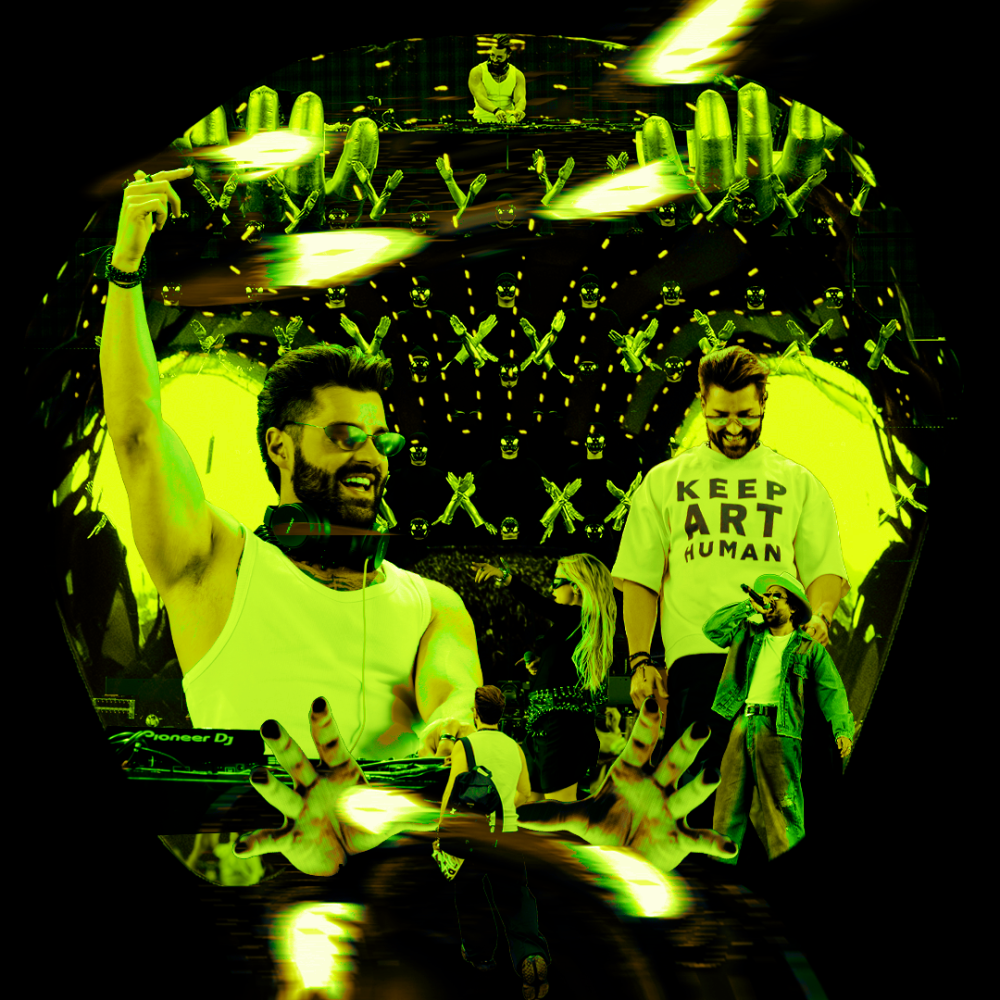
- Share via
As artificial intelligence begins to creep into the creative realm, one DJ aims to uplift the power of human artistry.
Last Saturday, Brazilian DJ Alok — whom DJ Mag notably ranked the No. 4 DJ in the world — made his debut appearance at the Coachella Valley Music and Arts Festival, where he took the Sahara stage at golden hour. He was accompanied by Brazilian American singer Zeeba and “Sweet But Psycho” hitmaker Ava Max, as well as 50 performers from the dance company Urban Theory.
Wearing masks and metallic gloves, the dancers used their hands to mimic machine-like movements, which they call “tutting.” The man-made spectacle, which appeared almost computer-generated, served as a reminder to “keep art human,” as Alok’s T-shirt read during the performance.
“ I’m just trying to [use my] platform to [uplift] the voices of a lot of artists that are afraid about what AI is doing,” said DJ Alok in a Zoom interview.

Alok, along with creative director Fabio Soares, envisioned this performance as a living art installation, hoping to contrast the mechanical movement of dancers with ongoing AI efforts to automate creative fields.
“ When humans are connected on the same purpose and synchronized, we can do stuff that is extraordinary, but we have to also trust each other,” said Alok of the concept. “If one dancer makes a mistake, it can compromise all of them.”
Ahead of the Coachella performance, Alok uploaded a teaser clip to his more than 29 million Instagram followers. In the comments, some expressed both skepticism and surprise at the ability of humans to perform such precise movements. At the very top of the responses, Alok pinned a postscript message for added clarity: “This is not AI.”
Brazilian DJ Alok at Coachella. (Filipe Miranda)
“ How crazy is that?” Alok marveled. “That people do not believe that humans can do this kind of stuff anymore, like everything has to be AI.”
The 33-year-old electronic artist acknowledged that certain software tools have helped him extract vocals, samples and instruments necessary to form creative beats. Yet he doesn’t believe AI should replace artistic sensibility, “because to create art, you need to touch the soul.”
“I’m not against AI. I’m just [concerned] about how we use it. Because anything in the world can be used to do damage or create good things right?” said Alok.
He recalled a drone show he did two years ago when performing at the United Nations in New York. After the show, he said someone from Ukraine’s embassy approached him crying and saying, “because in my country you use drones to kill each other and make war.’”

The beat maker — born Alok Achkar Peres Petrillo in Goiânia, Brazil — is no stranger to the cause of social justice. In 2020, he used royalties obtained from his popular gaming character in “Free Fire” to fund his own nonprofit organization, the Alok Institute, which boosts social and environmental initiatives in Brazil, Africa and India.
“ If you asked me 10 years ago if I cared about all this stuff, I would say no,” he said.
Two years ago, following a major depressive episode, Alok journeyed to the Amazon rainforest to connect with Indigenous groups. The experience changed his outlook on life.
“I was doing songs to work on the beats, they were doing songs to heal, you know?” he said, hinting at its irony. The experience inspired him to use his platform to aid in the preservation of Indigenous languages.
Through his institute, Alok unveiled a humanitarian project and album titled “The Future Is Ancestral,” which showcased Indigenous music from eight communities across Brazil. Its release came days before an annual protest in the nation’s capital, where Indigenous groups convened to demand more land protections. The album received praise from UNESCO and the United Nations; the song “Pedju Kunumigwe,” sung by the Guarani Nhandewa people, was nominated for a Latin Grammy for Latin electronic music performance in 2024.
“As an artist, we have the responsibility to try to push culture forward through art,” he said. “That’s why art has to be made by humans.”
Alok and Urban Theory will return to the Sahara stage on Saturday, April 19, at 4:10 p.m.
More to Read
The Latinx experience chronicled
Get the Latinx Files newsletter for stories that capture the multitudes within our communities.
You may occasionally receive promotional content from the Los Angeles Times.








